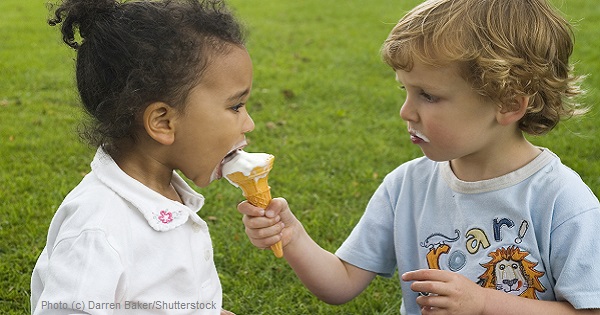 |
What Are They Really Learning? When we force sharing, children usually internalize the subtler, unspoken, and unintended message rather than the lesson that we are actually trying to teach. So we need to ask ourselves what we are actually conveying to them and if this is something desirable. It seems to me that making children “share” is actually teaching people-pleasing and compliance, as well as bossiness and control of others through the behaviors we are modeling, rather than true generosity. True generosity is a virtue and a blessing for both givers and receivers; people-pleasing and compliance are behaviors stemming from psychologically unhealthy attitudes and survival mechanisms that do not serve anyone’s best interest in the end. How many of us have problems saying no to our detriment or feel that we must say what others want to hear rather than share what we truly mean? True generosity – true giving – takes years to develop, and that's okay! (That doesn’t mean children won’t sometimes share on their own before they have internalized the value of generosity.) True generosity develops when we feel secure and are able to feel empathy and a sense of selflessness, if just for a moment. It develops when we know and experience what it truly means to give; not when we feel like we must give things away to others to be accepted or to win approval. Modelling Behavior Modeling is effective for this as well. Children will also share because to them this is simply what is done, it is the cultural norm within which they have been raised. They have experienced it on a regular basis in their homes and within their communities. They have seen people sharing freely and thus they assume it is the norm. So the general rule of “If you want something, give it (and for children this means do it many, many, many times!)” applies here. It takes at least eight years in most cases (according to classic child development theorists such as Jean Piaget) for children to be able to start to truly put others’ needs before their own. However, there are things we can do in the meantime to ensure that when the time is ripe that ability has been thoroughly nurtured. We can help children experience the joy of giving by involving them in giving to those in need. We can go through their toys together to give some away to charity and talk about how happy it will make someone feel. We can involve them in preparing and dropping off a meal for a family we personally know that is in need, or in writing cards for sick children or those in difficult situations. Or, for birthdays, we can involve them in choosing a charity to ask people for donations for instead of asking for gifts. Volunteering together at a soup kitchen or the like also helps children to experience the joy of giving as well as helping them gain a wider perspective on the world. These actions also reduce the feelings of entitlement and narcissism that seem to be on the increase today. Children are really never too young to start doing things like this. The good feeling children get from these acts of generosity of spirit will generalize into truly giving to others socially on a more regular basis. That’s because they will actually understand what it means to give, and want to do it on their own. Words are as Important as Actions It is also important to realize the true value of the language we use with young children. A concept does not exist for them as really concrete, true, and acceptable until we place a word on it. So we can make sure to use the words “giving,” “sharing,” etc. in our daily lives and when reading books or telling stories. “Look honey, the boy is giving his apple to the girl! That looks like it made her happy. The boy looks just as happy as she is that he shared with her!” This type of talk creates a concept for them and helps them to learn “mind sight” or the ability to see what is going on for other people, which leads to empathy, compassion, and overall wellbeing. We don't need to place value judgements on these acts such as saying it makes a person “good,” or “nice” for doing so (which implies that the opposite is true when they don’t). However giving honest, simple, descriptive information about how people feel when they give and receive is very valuable for children.
We know that children internalize not only our words and actions, but also our fears and other internal states even when we don’t realize we are passing them on. So, if a parent has a fear of being taken advantage of or an attitude of “lack” or of never feeling like they have enough to give away freely either emotionally or materially, this could lead to a child not feeling as comfortable sharing as they otherwise would have. Children are so open that they absorb everything from us, even the attitudes and beliefs that we don’t directly communicate. A child who is emotionally secure and confident, who has had an opportunity to develop true empathy and kindness from within (by experiencing and having these qualities consistently modeled and being given the space and trust to develop them on their own), will be more likely to become naturally generous. Making children “give up” what they have whenever another child shows an interest in it cannot only be considered disrespectful of their need to make their own choices about their belongings, but will actually work against the development of true generosity because they will have done it against their will and will develop a fear of giving what they have. This fear impedes their ability to give freely out of a place of security since any fear always undermines a sense of security. Sayings like “sharing is caring” can give children the message that we cannot care about another person if we do not give them whatever they want. This may seem extreme, but we must remember that children think very concretely and in black and white terms, especially in the first seven years or so. It is often all or nothing for them. These types of sayings can be confusing because a child may truly care about another person, and then feel guilty that they do not want to give their toy to that person. That can lead to self-questioning by the child in a way that they are not yet cognitively ready to grapple with, ultimately resulting in feelings of guilt, confusion, and self-doubt, with negative social consequences as well. In addition, I have often seen children become aggressive or hostile to other children when pressure is being put on them to share, because now the other children have been made into adversaries who could be given their toy at any time, instead of playmates to enjoy and learn from. Winning Approval In addition to these negative consequences and the loss of trust between parents/caregivers and children that commonly arise out of feeling controlled and misunderstood, there are other problems. Children who give their things away due to adults’ constant insistence that they must “share” are not doing so out of internalized values, understanding, or choice; they are doing it thinking they must do so to win adults’ approval and to make others like and accept them. The implied message children receive from forced “sharing” is that others will not want to play with them if they do not share. This last result – the giving-away for acceptance – is, for me, the scariest one. That’s because it can turn into a lifelong habit of people-pleasing instead of truly being oneself, firm in one’s choices and personal boundaries in order to maintain true, healthy relationships. Healthy boundaries are important, as is the ability to say “no” when we mean no and “yes” when, and only when, we truly mean yes. Just like we adults have a right to our own property and our own choices about who we give or lend things to, our children do as well. They must feel our support for this right in order to feel confident in our trust in them, and to develop self-respect. Examining Our Motivation If you are one of the many people who make your children share, you aren't alone; I used to as well. However, sometimes we must ask ourselves “why”? Why am I insisting on sharing? Did I even make a conscious decision to do this, or did I just assume it was the thing to do? Is it truly to “teach” a value (and of course values are not acquired by being forced upon someone, so if this is truly our answer we should have no problem rethinking our insistence that they share) or is it because it makes me uncomfortable when my child says “no” to others? Do I feel uncomfortable saying no to others myself? Am I afraid my children will not have friends if they don't share because I am afraid others will not like me if I don't give them what they want of me? Do I need my child to be accepted so that I can feel validated as a parent? If we can truly explore these and other questions that come up at times like this with our kids, we can really get somewhere valuable in our self-growth, because we can then ask ourselves valuable questions about our own inner-workings and decisions. Most of these reasons we have for forcing sharing upon our kids are just irrational fears when we really look at them, and the result is a false-sense that we are helping in some way. Does it help our children when we, a new generation of parents, follow cultural norms without thinking about each case first? Why do so many of us feel a need for approval through our children's actions? Why do so many of us feel an intense need for approval from others at all? Is it because of false messages and unnecessary and crippling control we received as children? Is this worth holding onto and perpetuating in our children? Aren’t our own values and judgements of our own behavior trustworthy and righteous enough? What makes other people's opinions inherently more important than our own? Is it even right to try to manage others’ perceptions of us at all over being our authentic selves – least of all through our children's actions? Why can’t we accept our children for the perfectly immature, egocentric, not-yet-able-to-share selves that they are? Surely, it has more to do with us than with them; after all, we already know that deep down they are perfect just the way they are. When we have this need to control or direct in a way that does not respect our children’s choices and developmental stages, I think it usually has to do with our own childhood and our insecurities. Exploring these questions through a method like journaling can lead to some wonderful breakthroughs and growth for us. And that can allow us to be truly present and accepting of our children for exactly who they are in the moment. In that way, we will then give them the security and the space to make the eventual choice, when they are ready (and this can take some years), to truly share with others in a way that we know is genuine, authentic, deep, and long lasting. That is the true embodiment of generosity. Jacqueline King-Presant, M.Ed. is a child development specialist and consultant.
| |






